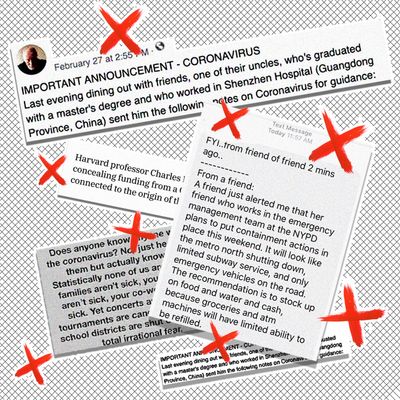
Please note the story you’re reading was published more than a day ago. COVID-19 news and recommendations change fast: Read the latest here to stay up-to-date. We’ve lifted our paywall on all essential news and updates about the coronavirus.
As the number of coronavirus cases in the United States spreads quickly and we’re all being encouraged to practice social distancing, there is another type of good behavior we can all implement right away to protect each other: Do not spread coronavirus lies.
Information is coming at us even more rapidly than it usually does — on Twitter, through our news alerts, and, as more of our daily lives are impacted by closings and cancellations, through our social channels and group chats. It’s good that we have the technology to inform others about our well-being and to share important logistical information, however, the temptation to share things we “learn” right away, without fact-checking, is dangerously high — especially things that haven’t been reported by a news service yet. Remember that a lot of apps incentivize this impulse to help something go, forgive me, viral. The types of messages that spread fastest have the most attention-grabbing content, so if you read something that shocks you and your first thought is to tell everyone you know, it’s not necessarily because that’s the right thing to do! It’s in part because of how the technology operates.
The lack of national leadership on coronavirus containment is by now well-documented. That makes it all the more important to practice good sharing behavior and take a breath before you spread a rumor, because people are really confused and scared right now, and for good reason. That’s also why bad actors could take advantage and, whether to be truly sinister or just mess with people, create fake information specifically designed to go viral.
Here are some coronavirus information best practices:
1. Consider your source.
When you hear or read a coronavirus rumor, think about where it’s coming from. Is it someone’s “Uncle with a master’s degree,” like this one disproved by Snopes? Is it a friend of a friend of a friend? Count the amount of “fwds” in the email subject line. Even if it’s a message from someone with more authority than, say, “a friend in the mayor’s office,” that doesn’t mean you should share it — as we discovered in New York today, when this was going around:
New York City mayor Bill de Blasio’s press secretary debunked this rumor about the city going into quarantine this weekend, even though it supposedly came from someone in that office. In reality, the mayor announced that schools would remain open, no subway closures at this time, and that gatherings would be restricted to 500 people.
2. Even if you trust them, ask, “Hey, where did you get this?” before you send something around.
Another message that went around New York today was a story about someone having lunch with Mike Bloomberg’s daughter Emma Bloomberg, who somehow also knew about the impending New York quarantine (which has not happened). The message apparently came from someone telling their co-workers about it in a Slack channel. Did this person intend for someone else to then spread it around? We don’t know, but it seems to have quickly spread anyway. (It, too, was debunked by the mayor’s press secretary.)
3. Google it.
If you’ve received a potentially false rumor, someone else might have, too, and a quick Google search can reveal if it has already been debunked. For example, people sharing conspiracy theories related to Dr. Charles Lieber, a Harvard scientist recently arrested for selling laboratory knowledge to the Chinese government, could have learned immediately that his arrest had absolutely nothing to do with the coronavirus before sharing viral claims linking the two on Facebook, if only they’d entered his name into an internet search bar. Consider doing a quick check before you share something. Snopes.com and FactCheck.org are very helpful.
4. Sign up for alerts from your local government.
In New York, you can text COVID to 692-692 for alerts as soon as they become official. Check if your city has a similar system set up so that you can be among the first people to know the latest developments and spread them to your networks, if that’s your thing. The New York system actually sent out an alert debunking the rumors of a transit shutdown.





